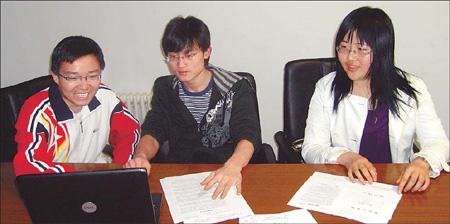
Tsinghua student Liu Qingpeng (left) discusses with his classmates. provided to China daily
At 21, company GM plugs big future for car battery recharging stations
Despite his modest beginnings, Liu Qingpeng, a senior at the Tsinghua University Law School, has no fear of the future.
At 21, he has already fulfilled his high school dream of starting a business.
Now he is the general manager of No-balk Transportation Technology Co Ltd, which is working to establish electronic bicycle battery charging stations on college campuses in the capital.
Driven by the pursuit of wealth, Liu believes his hard work has paid big dividends.
Growing up in a poor household made him work all that much harder, he said.
"I grew up in the countryside near a small city called Gaomi in Shandong province," Liu said. "My family had a very difficult time when I was born.
"We had nothing to eat. For three meals a day, my parents had to borrow from our neighbors. Every day we ate only rice or noodles; there was neither vegetables nor meat."
Despite that hardship, Liu had more chances to experience the world outside school, compared with urban children, he said. When he was 11 years old, he began following his parents as they ventured near and far to make money.
"The income from crops barely made ends meet in my family," said Liu.
"When we had school holidays, I would go with my parents to do business, such as selling farm products."
He laid the groundwork for success immediately upon entering Tsinghua. Recognizing the importance of social networking in business, he joined several student associations, including the Tsinghua Venture Capital Association and the New Energy Technology Club.
"Tsinghua University is a very good platform in which to pick up knowledge and build your own network," he said.
"In my company, all the staff members have graduated from Tsinghua. They have the best skills in technology. I found them because most of them were my friends."
It's no coincidence that Tsinghua is also the campus that No-balk Transportation is targeting for its first battery charging station.
Along the way, Liu also surmounted numerous obstacles, the biggest of which was finding capital investment.
"I wasn't born rich, which meant that I had to make a greater effort than others to get close to success," he said, "I went to many investors explaining my business plan. Some were interested and some were not. This is a very frustrating part of the job."
Liu concluded that investors come in two flavors: the entrepreneur-turned-investor and the venture capital investor.
"I can tell the difference in these two by looking their clothes and their style of talking," Liu said.
"An entrepreneur-turned-investor is usually young and wears casual attire. He talks fast, just like me. When I tell them my business plan, they act very excited and seem very passionate about the new technologies that we have developed."
"However, venture investors are dressed formally. As the employers of their companies, they are usually more than 50 years old.
"Some of them are even bald. They talk very slowly and like listening rather than talking. For them, I would emphasize that the project is profitable and we will make our best effort to avoid risks."
Although his company has not yet made a profit, Liu is constantly improving the technology of its products and is scouting for ways to promote them in the marketplace.





